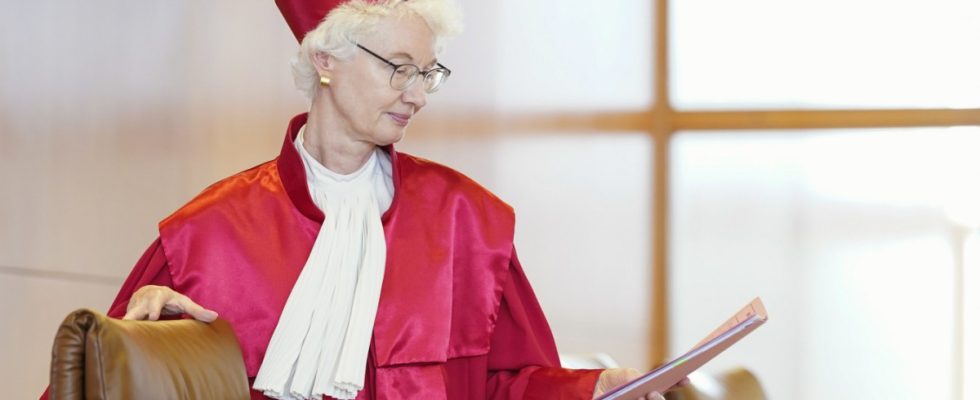Sustainability is a term that can be used in many different ways, as was evident this Wednesday in the Karlsruhe courtroom of the Federal Constitutional Court. The government and opposition sat opposite each other there, because the Union faction sued the traffic light coalition because they had violated the debt brake by creating a special fund worth 60 billion euros. A lawsuit in the service of sustainability, because today’s debts are tomorrow’s burdens. From Ampel’s point of view, the loans should of course serve a good – because sustainable – purpose: They have now been transferred to a climate and transformation fund to mitigate the consequences of climate change for future generations.
The hearing was a premiere for the Federal Constitutional Court, because it is dealing with the debt brake that was changed in 2009 for the first time. It was written into the Basic Law under the impression of the financial crisis as a remedy for the escalating national debt. But because politics cannot cope with the unpredictable course of time with thrift alone, an exception was made for natural disasters or exceptional emergency situations. That was far-sighted, and in 2020 the time had come – the pandemic hit the country, the government needed money and used the emergency clause to get it. Nobody raised any objections to this, because the exceptional provision was intended for precisely such cases.
Why the climate crisis is not an emergency
However, when it became apparent during the course of the crisis that a credit authorization of 60 billion euros would remain, the government did not want to simply let the additional funds lapse, but shifted the amount to a special fund for the next crisis – an energy and climate fund ( later transferred to the Climate and Transformation Fund). But the climate crisis, and there is also agreement on this, is not an emergency in the sense of the debt brake, but a long-term transformation task.
Which begs the question: Was that simply a creative rebooking to get past the debt brake? Or was the country still suffering from the economic consequences of the Corona crisis, which the government now intended to alleviate with the nice money, of course.
Sibylle Kessal-Wulf, the rapporteur responsible for the procedure in the Second Senate, formulated the question as follows: “Would it be conceivable that an extraordinary emergency situation such as the pandemic would result in another extraordinary emergency situation that one would have to react to?” And should the emergency money then also be used for “collateral purposes”, such as climate protection?
The Minister of Finance is concerned with “getting back into normal waters”
This is how Finance Secretary Werner Gatzer sees it, speaking for his absent Minister Christian Lindner. The national economy has weakened and the economy has hardly recovered. “It was therefore important to create planning security for private investors as well, in order to get back on track. That is what the debt rule provides for.” Incidentally, the debt ratio is currently back at a respectable 67 percent, on course to 60.
Now there seemed to be an understanding on the bench of judges for the pragmatism that is necessary in such situations – and for the fact that politics in times of need should not be tied down by too narrow legal requirements. For example, there has been a lot of talk about whether exceptions to the debt brake can only be made for “immediate” consequences of an emergency situation or for “indirect” ones. And whether the emergency program would have to be “reasonable” in the end.
“That seems extremely difficult to me,” said constitutional judge Christine Langenfeld. How should one distinguish between direct and indirect consequences of an emergency? And how do you want to measure whether the government has acted “proportionately”? Certainly, the provision must be judicially controllable. But the court should not intervene in the separation of powers and give up the government – in the interests of proportionality – instead of raising taxes instead of loans.
On the other hand, as her colleague Peter Müller pointed out, the debt brake is in the Basic Law, intended to stop the march towards a debt-ridden state. But if one were allowed to happily take out loans to combat all the consequences of the economic crisis: “Doesn’t that lead to boundlessness? Doesn’t that make the regulation meaningless in the end?”
It is therefore not really possible to predict how strictly or how generously the court will interpret the debt rule in its judgment in a few months’ time. It is unlikely that the court will reduce its control to zero. However, it is conceivable that the maneuver with the 60 billion euros will be criticized for violating general budget rules. The provision of funds must always refer to the financial year. The billions were parked in the special fund, so to speak – ready for retrieval even at a time when the emergency situation is already in the past. Karlsruhe could call the legislature to order here without overly restricting the scope for times of need.

